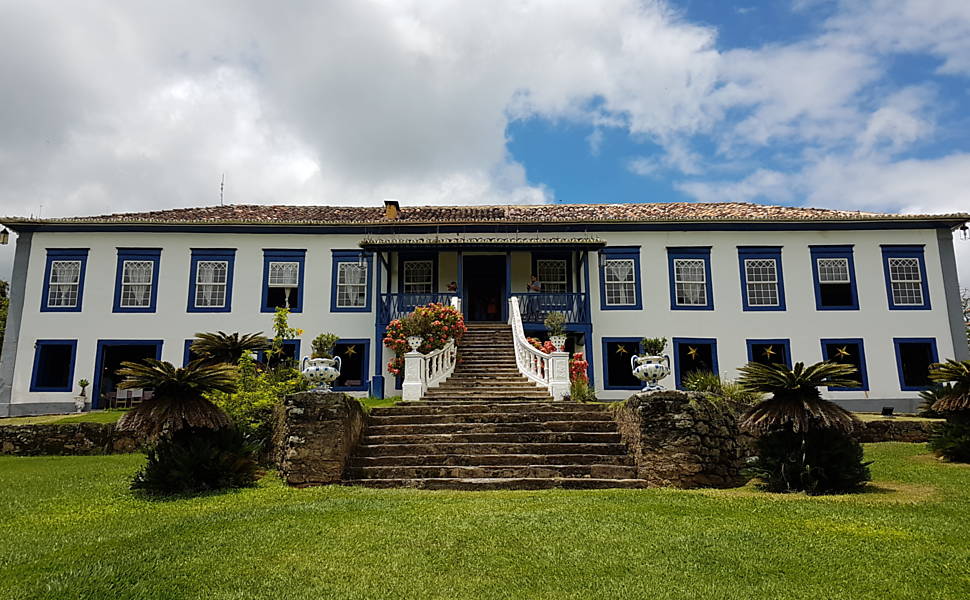Latest Photo Galleries
Brazilian Markets
17h36 Bovespa |
-0,17% | 124.171 |
16h43 Gold |
0,00% | 117 |
16h59 Dollar |
-0,48% | 5,2424 |
16h30 Euro |
+0,49% | 2,65250 |
ADVERTISING
Bananal: History Meets Nature in the Interior of São Paulo
03/02/2017 - 11h01
Advertising
JÚLIA ZAREMBA
FROM SÃO PAULO
Bananal attracts not only those who appreciate history but fans of nature tourism as well. 326 km and five toll-booths from the São Paulo Capital, it is known for its eighteenth-century mansions, dating from the coffee plantation period, and for natural beauty like waterfalls and a vast area of Atlantic forest.
Bananal's history began in 1783. It was initially populated as a village and later became a municipality in 1849. Today it is one of 70 tourist resort areas in the State.
It grew and prospered during the coffee period, which left behind mansions and imposing farms, which have been transformed into museums and hotels.
The historic tour takes you through five farms: Boa Vista (Good View), Três Barras, (Three Beams) Loanda, Resgate (Redemption) and dos Coqueiros (Coconut Trees).
The first two also have hotels. All of the hotels have colonial architecture, baroque and antique furniture, porcelain objects and frescos.
Some owners have kept remnants from the period of slavery, like Senzalas (slave lodges). An entrance fee of R$ 10 to R$ 17 (US$ 3,22 to US$ 5,50) is charged to visit the farms (except for Três Baras, which charges no fee).
The Boa Vista farm is the largest. Constructed in 1780, it was the largest coffee producer in the region in the 19th century. In 1972, it was transformed into a hotel.
The blue and white mansion with its palm-tree-lined mall entrance is used as scenery in telenovelas.
The Resgate, which was taken over by IPHAN (Brazilian Historical Heritage and National Artistic Institute), originally belonged to one of the richest men in the country at the time, Manoel de Aguilar Vallim.
It houses a chapel with paintings detailed in wood and gold. Although the farms are relatively close to one another, the route between them has to be travelled by car.
A good stop along the way is the Fazenda Resgatinho (Little Redemption), one of the best-known distilleries in the region. The tour continues on through the historic center, passing through streets made of paving stones and preserved facades of buildings from the 19th century.
Visitors can also see the old Train Station, which today serves as a Post Office.
It was imported from Belgium and constructed in 1889. But the train that sits in its entrance never actually ran on the tracks there - it was a donation from the São Paulo government a few years ago.
The original train was a Maria-Fumaça (wood burning steam powered train).
After the historic tour, it's time to get to know the waterfalls in the city. One of them is located in the Recanto da Cachoeira (Waterfall Alcove), a privately-owned area which has a natural pool and rapids.
The entry fee is R$ 10 (US$ 3,22) and visiting hours are from 9 AM to 6 PM.
Another option, the Bananal Ecological Station, rises up 1.113 meters in height and has two waterfalls.
According to Tatiane Souza, the station's administrator, the purpose of the unit is to preserve the fauna and flora of the Serra da Bocaina (Bocaina Range) and facilitate environmental education and research.
But the path to get there is complicated: you have to follow the Sebastião Diniz de Moraes highway (SP-247) for 15 km, and then continue for 10 km more on a rocky road inside of the Atlantic forest.
The waterfalls are located approximately 200 meters from the station and visits, which are free of charge, have to be scheduled in advance.
Translated by LLOYD HARDER




